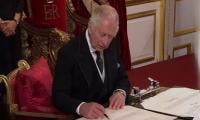After the recent takeover of Kabul by Taliban, the children of Afghan refugees studying at various schools across Karachi, Pakistan’s largest city by population, are now facing uncertainty, wondering if the Taliban regime would continue awarding certificates to them, as was the case during the Ashraf Ghani government.
The Afghan educators who have been residing in Karachi’s Sohrab Goth as refugees since the Soviet Union’s invasion of Afghanistan have set up five or so private schools.
Only one of them, the Syed Jamaluddin Afghani School, was recognised in 1996 by the Rabbani government in exile, and later on by the Taliban regime, and the Hamid Karzai and Ghani governments.
Syed Hadi Hashmi, an elderly Afghan refugee, had established the Syed Jamaluddin Afghani School in 1992 with the aim to educate the children of Afghan refugees. The students of the remaining schools, a majority of which teach religious studies with some modern curriculum, applied for equivalence certificates from the Ministry of Education of Afghanistan. However, a majority of the students got their certificates by themselves at the educational institutes of Afghanistan.
These schools have been generating funds from collecting fees and donations, and the financial aid provided by the well-settled Afghan refugees. After the Taliban takeover, however, the future of these schools hangs in the balance.
They had been making efforts to provide platforms for learning to hundreds of children, but now they might be heading towards closure. Thousands of Afghan children do not go to school because they help their parents with work, and most of them can be seen collecting recyclable things across the city.
“We have to pay rents, utility bills, salaries and others expenses. A major part of the operating costs comes from fee collection,” Abdul Karim, an Afghan educator who resides in Sohrab Goth, told The News.
“But due to the current situation, the earnings will be further reduced. The students will prefer to move to Western countries or start their businesses because they see no future for the educated people in Afghanistan to return.”
Girls first victims
With the future uncertain, girls have been more distraught with the grief of losing their educational career in this dilemma. Talking to The News, a majority of the female students said they have no clue about their future, as they see no option for themselves.
“No good news about education has been coming from Afghanistan. Taliban have already barred all women from working, while female students of higher institutions are still reluctant to continue their studies in Afghanistan,” said Karim.
“This is why the female students studying at our schools in Pakistan won’t work hard in anticipation of their graduation or for continuing their education.”
Among the enrolled students, around half are girls, who are studying at the schools established by Afghan refugees. “The girls were already in a state of misfortune as regards getting access to education,” said Karim.
“The regressive approach of Taliban towards girls’ education will surely curtail the chances of access to education for the female population. They won’t have a chance to pursue higher
education or acquire a job in the academia, industries, governance, bureaucracy and others fields in Afghanistan.”
School curriculum
“We’ve been arranging separate classes for boys and girls, and have hired male and female teachers to run the schools. At the same time, we teach the same curriculum that was approved by the last Taliban regime,” said Zikrullah, administrator of the Syed Jamaluddin Afghani School.
“No major change has been made in the curriculum in the past two decades, apart from adding or subtracting a few subjects such as languages, including Pashto and Dari, and geography with Islamic studies, Madani education, Arabic, Islamic history, etc.”
He said the school imparts religious education in the evening shift and modern education in the morning shift. “We have an identical Islamic education system but are still unsure if the Taliban regime will issue certificates to our students. We know nothing about the future of our students.”
He, however, added that they would continue to educate children regardless of their gender. But certificates of unregistered schools being run by Afghan refugees are not accepted by Afghanistan’s education ministry. “We’re not responsible for providing jobs to our students. We merely want to educate more and more children.”
The only option
Syed Mustafa, the school’s headmaster, pointed out that in 2018 the United Nations High Commissioner for Refugees had said in a statement that the Pakistani curriculum would be taught at primary and secondary levels at the refugee schools.
The decision was aimed at Afghan children receiving certificates approved by the Government of Pakistan, following which the refugees’ children would be able to get admission in colleges and universities in Pakistan or Afghanistan.
The problem, however, is that almost all the public colleges and universities need domiciles for admissions, and the refugees’ children cannot furnish domiciles at the time of admissions. This is why the only option is for these schools to be recognised by the Taliban government so that the children can continue their education in Pakistan.
A policeman stops people at a checkpoint in Karachi, Pakistan. — AFP/FileThe Karachi traffic police on Saturday...
A representational image of a gavel in a court. — Unsplash/FileHYDERABAD: The court of the second civil judge and...
A representational image showing a person handcuffed and standing behind bars. — AFP/File The Preedy police on...
Sindh Health Secretary Rehan Iqbal Baloch speaks during an event. — @HANDSPakistan/FileSindh Health Secretary Rehan...
This image shows the building of the Sindh High Court in Karachi. — Facebook/Sindh High Court Bar Association...
A representational image of a handcuffed man. — Pexels/FileThe Anti-Encroachment Force in District East apprehended...







